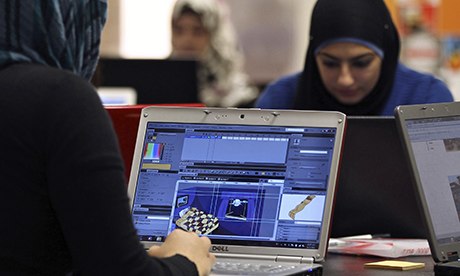
Technology competitions are in need of a reality check. From the UN to Google, there are hundreds of competitions that aim to find the next innovator from Uruguay or Botswana and give them the money they urgently need to set up or scale up their businesses that aim to tackle some of world's greatest challenges.
At the young innovators competition that took place in Thailand in November – as part of the International Telecommunication Union Telecom conference, Africa's young tech entrepreneurs were well represented. Ugandan entrepreneur Brenda Katwesigye entered M-Tambula, an app that gives people access to public health services; Kenya's Thomas Kioko showcased his road safety mobile application and Nigeria, Africa's largest mobile phone market was represented by Oscar Ekponimo with his SalvageHub, a web and mobile platform designed to tackle food waste.
The young innovators programme targets the most promising young social entrepreneurs, between the ages of 18 and 26. Each year hundreds compete for one of 10 prestigious places in the programme. The selection process is strict and multi-phased, but is designed as a learning process, where important recommendations are made to candidate and their ability to successfully integrate these and improve their business plan is taken into consideration.
A few of these startups are already up and running in their countries but are in need of serious funding in order to take their businesses to the next stage. Enterprises that are still at concept stage but that have the potential to solve problems are also considered.
The ten finalists are invited to the ITU Telecom World event for a four-day accelerator programme consisting of hands-on workshops with mentors, of which I was one this year, and experts. They are then given the chance to pitch their ideas to the high-level audience, as well as a panel of judges, who will then determine the financial award that each project should receive. Typically, concepts win up to $5,000 and startups up to $10,000. For a year following the conference, the finalists work together with their mentors to roll out their projects. To report back on the execution and development of their project, they are invited back to the following ITU Telecom World event, where they will be expected to peer-mentor the new winners.
While competitions like this provides much needed financing in a way that is responsible and accountable, recent stats from the International Labour Organisation make their contribution seem almost insignificant. ILO estimates that close to 73 million young people are unemployed in 2013. This begs the question: if we continue to just give funds to small startups without providing them with much needed skills, such as business development skills, product development skills, marketing skills, accounting skills and so on, we the tech community and world leaders will be solely responsible for the failure of these youngsters. Young innovators are budding technologists, not business mavericks and competitions have to acknowledge that.
Many young people are creating their businesses as a way out of the uncertainty of their lives, and into the prosperity they dream about. Innovative companies in emerging countries that are still in their infancy have the potential to catalyse new markets and help address the youth unemployment challenge. But to do all of that we can't simply enable young people to start innovative businesses, we must also help them sustain those businesses.
If it is advantageous for the above reasons to focus on tech companies in emerging markets, then it is imperative that we look into the industry thoroughly. Here are few starting points:
1. Create an inventory of all the current tech companies that exist in Africa (startups and SMEs included) in order to have comprehensive and verified data for the tech industry.
2. Invest in due diligence and valuation of all tech companies by industry in Africa.
3. Facilitate cross-regional learning and sharing in order to have a more balanced industry, rather than pockets of brilliance.
4. Couple early stage investment and grants with substantial mentorship so that these startups can scale up or at least become self-financing.
My argument is not that competitions that help identify young tech talent from African countries aren't of value but that they could offer much more value by providing talented entrepreneurs with much more than money: knowledge and strategic guidance. Competitions offer visibility and can sometimes help young entrepreneurs boost their credibility. But we should never have competitions without investing in market research and mentorship.
If the aim of tech for good is to lift people out of poverty by supporting young innovators, we must do more to ensure their businesses have a better chance for survival. The return on investment won't just be theirs but society's.
Originally featured on The Guardian website.